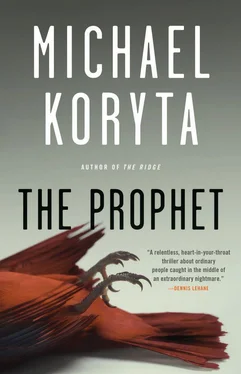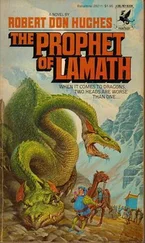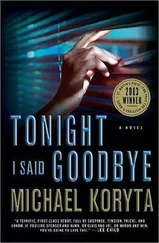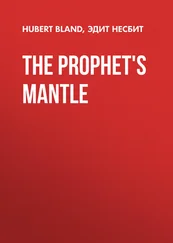Back to the field, and Angola was broken. After that fourth and two, Angola’s defense was done and they knew it.
“I wish Ward hadn’t run it every play,” Kent said. “Or he could have let him have a carry. Adam was on the field for every snap, we ran him fifteen straight times, seven of them with his hand broken, and on the stat line he never gained a yard. On the stat line, he’s standing still.” His voice had thickened, so he coughed to clear his throat and said, “Watch what the safety does here.”
They took the snap, fifteenth of the drive, first and goal from the nine, and the line opened a nice gap and Adam came through it and the Angola safety, who’d dropped down in the box to stuff the run, winced ahead of the contact, stiffened up and turned his head a bit just before Adam hit him, just before Chambers cruised into the end zone for the score.
“He tried to get out of his way,” Colin said. “He didn’t want any piece of him.”
“No, they did not. Not by then.”
“They make it close on the next possession? Have a chance?”
“Nope. Turned it over on downs.” Kent was suddenly regretting his choice to screen the game, and he didn’t know why. He’d wanted to show Colin the way his brother played football, and Colin seemed impressed, so why did Kent wish he hadn’t watched that tape?
“Let’s look at Saint Anthony’s,” he said, getting to his feet. “That Angola game’s more than twenty years old. We’ve got our own to work on.”
37
THAT NIGHT ADAM WAITED until Kent called to tell him that the kids were in bed, and then he returned to the house to occupy his post.
“You haven’t heard anything from the police?” Kent said. “Still?”
“Not a word. You get any updates?”
“Not today. They don’t seem to be making much progress.”
Adam didn’t say anything to that. He was looking at the pictures in the living room and was amazed by how old Lisa was getting, how tall Andrew was. He never saw them. Lisa would remember him, but he wasn’t sure that his nephew would recognize him. Adam had visited the hospital when he was born, and come by on his first birthday with a gift, but never again. He looked at the photographs and thought that the kid was getting old enough to be some fun.
“They’re great kids,” Kent said.
“I’m sure they are.” He almost said I’d like to get to know them, but he stopped himself, turned away from the photos, glanced out at the street, and touched the butt of his gun as if to physically remind himself why he was there.
“You don’t need to stay awake all night,” Kent said. “Stay in the guest room if you’d like, or at least stretch out on the couch and get some—”
“I’m good.”
“Okay.” Kent hesitated, then said, “I watched the Angola game today.”
“What? Why?”
“Wanted to show Colin Mears. You know, last time the school won state, all that.”
“You’ll get it this year.”
“We’ll try.” Kent shook his head and said, “That was a hell of a game you played. That last drive… I mean, I remembered it, but watching it again was impressive.”
“All I did was open some gaps. Evan Emory did the running.”
“You opened craters. He could have done the walking, still would have scored.”
Adam shrugged. “How’s Mears?”
“Struggling.”
“I’m telling you, let him hit.”
“I know, I know.”
Kent seemed to regret having brought it up now, which wasn’t Adam’s goal, but he didn’t know what he was supposed to say about a twenty-two-year-old football game. He searched for something, some lighter memory from the pitch-black year that was 1989, the only year they had played together, and said, “You remember Tater?”
Kent smiled. “Tater Phillips? Yeah.”
Tater was a backup offensive lineman who had earned his nickname for an unfortunate resemblance, in shape and speed, to a potato.
“I’ll never forget the day Ward about killed him with the sled,” Adam said.
That brought a laugh from Kent, and Adam was smiling, too, couldn’t help it. Walter Ward had purchased a used tackling sled at an auction, which he then proudly set up in an open grassy area just outside the field—and at the top of a gentle hill. Featuring six angled tackling dummies connected through a steel frame, the sled was a massive piece of equipment, weighing hundreds of pounds. And mounted on wheels. Ward hadn’t experimented with his acquisition yet, confident that he understood all there was to understand about a tackling sled, but he did not understand the locking brakes. They’d run through a few rounds of hitting before the sled began its trembling slide. Ward’s first reaction when he realized it was going to roll down the hill was to tell everyone to get out of the way. It was about two seconds later, enough time to allow it to build a good head of steam, when he spotted Tater Phillips lumbering up the hill, late to practice after a trip to the trainer, his helmet on and head down.
“I thought I had heard Ward scream as loud as anyone could scream a hundred times before that,” Kent said. “But that was when he was angry. When he was scared? Wow, he hit a different level that time.”
Adam nodded. “It looked like some piece of farm machinery going at Tater. A combine or a thresher. Tater somehow oblivious to the whole thing.”
“Tater usually couldn’t get out of his stance in under three seconds, but I swear he covered fifty yards in three seconds when he finally saw it coming. He dodged it by an inch and then it wiped out the side of Byers’s truck. Always so lazy he insisted on parking it at the curb instead of the parking lot. He’s been in the lot ever since. I haven’t given him grief about that in years. I’ll need to do that tomorrow.”
“Give him my regards,” Adam said. They held the shared laugh for a few seconds longer, but then it was gone, and Adam was conscious of the holstered gun again, conscious of his job in this house. “All right, Franchise. Go to bed. I should be paying attention to the street.”
The street stayed empty. Clayton Sipes made no appearance. Rodney Bova did not leave his home. They were patient. That was fine. Adam could be patient, too. There was another word for his kind of patience—relentlessness.
They would break at some point. One of them. And he’d be there when they did.
The next day, while Adam sat in the office and watched a red dot, Chelsea went to prison to tell her husband that she was going to file for divorce. Before she left, she told Adam that she was going to let Travis Leonard keep the house.
“You’re the one who’s been paying the bills on it for years,” he said. “Why in the hell would you give up the house? It’s the only thing he’s got.”
“That’s why,” she said. She was dressed unusually formally, black pants and a long-sleeved white shirt, crisp and ironed, as if she felt a responsibility to look professional delivering the news. “He had two things. Me, and the house. I’m not taking them both from him.”
Adam gave that a slow nod, then said, “Where will you live?”
“It’ll take some time to get everything done, to move out. It will take some time. But when it’s done… we can talk about that, Adam. We’ve essentially lived together for a long time now. I’d miss that, wouldn’t you?”
“Of course. I was expecting you’d stay with me.”
She looked him in the eye. “Not at your house.”
“What?”
“I can’t live there,” she said, “and I think it’s time for you to consider moving on.”
He didn’t speak.
“You remember your sister, you think of her daily, you carry her with you,” she said. “That’s all good. Honorable, healthy. What you’ve created in that house is not healthy. Your brother is right about that. You’ve got felony charges to prove it.”
Читать дальше












